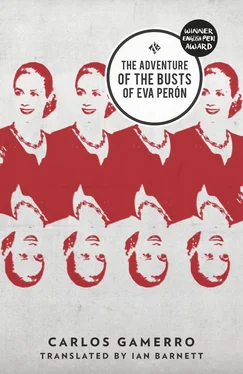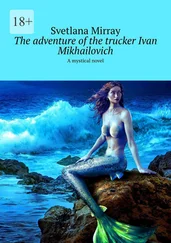‘Are you and Monique still together?’
Paddy let out a loud, sarcastic snort.
‘Yeah, right! She works as a model by day and drops round my bedsit to rustle me up some spaghetti on the Primus at night. We separated the day I became an activist.’
‘Oh. Sorry to hear that.’
‘I’m not. Monique was a trap. You have to be awake, wide awake… So, tell me. What were you doing with the notebook when the comrades caught you?’
Marroné reeled off the spiel he had prepared.
‘I was just jotting down their names because I think of the strikers as individuals, not an anonymous mass. I came down to look for one of the ringleaders to organise a joint activity, a kind of workshop, for office staff and workers, so the two sectors could get to know each other better and maybe find out that their ideas, their problems, their interests aren’t that different after all… Actually, I’d thought they could spend an afternoon — today if you’re on-board — making a series of plaster figures…’ he took a deep breath before the plunge, ‘… of Eva Perón, as a token of fellow feeling between blue and white collar… But, as even the workers are “white” here, the first step’s already been taken,’ he concluded with affable acumen.
Paddy stared hard at him, without even blinking, then shook his head like a father about to reveal to his son the true identity of Father Christmas.
‘It won’t work, Ernesto. Like the typical petits bourgeois they are, office workers do their level best to live up to the bourgeoisie, which they aspire to, and to differentiate themselves from the proletariat, which they’re terrified of slipping into. They may occasionally form a tentative alliance with the proletariat if they think they have something to gain, but when it’s their arses on the line, you just watch how fast they throw in the towel. That’s why the only option, Ernesto, is to proletarianise yourself. If you like… I can give you a hand.’
‘Well… thanks…’ said Marroné, trying to buy some time, ‘I’d have to think about it.’
They’d reached the foot of the statues’ cemetery, a towering mountain of broken or faulty pieces shining in the sun like a snow-capped peak. Marroné scoured the rubble in the vain hope of discovering a forgotten trove of chipped but still usable busts of Eva, but the nearest thing he found was a torso of Marilyn trying to push down her skirt to hide the fact that her legs were missing. Paddy rolled a battered Corinthian column over to him and, sitting astride an Ionic one, invited him to do the same.
‘Look,’ said Paddy after a second’s pause, alluding to the mountain of smashed pieces with a wave of his hand. ‘What do you see?’
Marroné ran his eyes over the jumbled heap: cracked mouldings, split columns, shattered amphorae, a legless David, a Discobolus whirling his stump, the masks of comedy and tragedy with missing jaws so you couldn’t tell which was which, a ballerina tying the laces of a non-existent dance shoe, a Perón with a broken nose who resembled the Sphinx, an armless Botticelli Venus that looked like the Venus de Milo, a headless Venus de Milo that looked like a wingless Victory of Samothrace, the two halves of an Aztec calendar…
‘There’s a very high proportion of damaged pieces. The productivity index…’
‘There you go again. You see everything from a business viewpoint. You don’t think about the meaning of human labour. What does it mean to make these copies?’
‘Errrr…’ Knowing that, however hard he thought, the evil spirit of the bourgeoisie would put the wrong answer in his mouth, he chose to gain time with an innocuous vowel sound.
‘Exactly. Nothing. Ours is a culture of copies, imitations, replicas, and shoddy workmanship on top of that. Look at this,’ he said, picking up a Pietà in which, rather than swooning his last, Christ melted like mozzarella over his mother’s knees, who contemplated him more in disgust than in sorrow. ‘Who could confuse this miscarriage with Michelangelo’s original? We try to be like them and this is what we come up with,’ he said, tossing it back on the mound. ‘This mountain of ruins, of tack and broken replicas, is a monument to the borrowed culture we have tried to assemble out of our masters’ leftovers. We content ourselves with fragments, with copies of copies, and, by fixing our eyes on them, we blinker ourselves to our own reality.’
Paddy had a point. Staring so hard at the broken pieces had dazzled him, and several little piles spun in a kaleidoscope of black residual images on his retinas.
‘Europe’s finished, like Fanon says. We have to leave it behind. You’d better start getting used to the idea. We have to travel light on this trip. And the day we arrive, we’ll have to burn the boats.’
‘What do you mean?’
Paddy pulled the two halves of the Aztec calendar from the immense pile and put them together so the break was invisible.
‘When we’re like this,’ he said, holding together the solar disc, ‘we’ll have to forget all this.’ His bright eyes cast a doleful glance over five millennia of useless western culture gathered in a sad heap of broken images at their feet. ‘Paris. El Greco. Shakespeare,’ he mused, with anticipated nostalgia.
Marroné decided to add a healthy dash of dissent.
‘But you used to like Shakespeare.’
‘True. Remember when we read Julius Caesar ?’
‘Yeees,’ he began hopefully, thinking he could steer the conversation towards Mark Antony’s speech, considered by both Dale Carnegie and R Theobald Johnson as the best Shakespeare had ever written.
‘A play where the revolutionaries who want to save the republic are depicted as villains, and the dictator and his henchmen as heroes. And the people? They’re either portrayed as idiots who let themselves be led by the nose or as a savage mob that goes around murdering people indiscriminately and torching everything in sight. If Shakespeare had been Argentinian, he’d have had Peronist mobs sticking their feet in the fountain and burning down the churches — the whole shooting match. I’m telling you, it couldn’t be more anti-Peronist if it had been written by Borges rather than Shakespeare.’
Marroné gulped twice before answering. He was having trouble applying the principles of Dale Carnegie to Paddy’s conversations. Very serious trouble.
‘But we have a lot to learn from reading his plays,’ implored Marroné. ‘From Hamlet , for example…’
‘Yeah, I’ll give you that. A critical reading of Hamlet could help you make the leap from intellectual doubt to revolutionary certainty. If Hamlet would just stop navel-gazing, he’d realise there’s a world outside the palace walls: beyond them the people of Denmark await him. If he’d taken the side of the people, all his doubts and hesitations would have evaporated as if by magic: he’d enter the winter palace with fire and sword, and wreak his revenge, because it would no longer be in the name of his father — who, let’s face it, was just another oligarch — but in the name of the oppressed Danish masses,’ he concluded. Then, after a barely perceptible pause: ‘Ernesto, I want to ask you something, and I want you to answer me as honestly as you can. What does Eva Perón mean to you?’
The question took him completely by surprise. In despair he reached for a rule from How to Win Friends and Influence People , but his mind had gone blank.
‘Errr… The Spiritual Mother of all Argentine Children… The Plenipotentiary Representative of the Workers… The First Argentinian Samaritan…’ He salvaged the phrases from his childhood memories, trying to wring from them the sarcastic tone his father used to give them as he spat them through clenched teeth. But he couldn’t quite manage it. ‘Perón’s wife. I don’t know. Nothing,’ he eventually admitted.
Читать дальше











